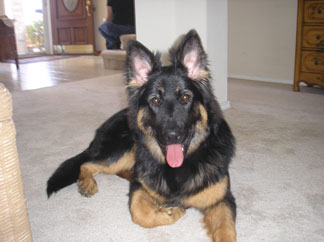Bloat in the German Shepherd is potentially very dangerous.
Bloat in the German Shepherd, aka gastric dilatation - volvulus(GDV) is a problem many dogs may face, most especially any of the deeper chested breeds.
Keep in mind that this is a potentially life threatening condition and should be taken very seriously.
Bloat should be handled as an emergency and your dog taken to a vet or emergency vet facility asap!
How does bloat happen?
One typical scenario includes a large, deep-chested breed of dog (such as an Akita, Great Dane, German Shepherd, St. Bernard, Irish Wolfhound, Irish Setter, Sighthounds, Doberman Pinschers, Weimaraners, Bloodhounds), which is usually fed once a day, and has the habit of "inhaling" it's food, gulping air, or drinking large amounts of water right after eating. Now add any kind of physical exercise after a full meal like this, and you have the perfect recipe for gastric torsion.
Bloat requires immediate veterinary care. Bloat in the German Shepherd is a true emergency condition. Most often surgery is the only way to handle the condition once it happens.

Although it is not necessarily thought of as a geriatric disease, recent studies do suggest that risk increases as the dog ages. In the most recent studies it was shown that dogs 7 years of age or older were more than twice as likely to develop bloat as the 2-4 year old dogs in the study. It is also thought that some certain bloodlines within particular breeds may be more susceptible to GDV than others.
|
What are the signs of bloat? |
|
What can alleviate this problem?
Bloat in the German Shepherd is not necessarily a dietary problem. Feeding management, however, may help cut back on many bloat related problems and, believe me, prevention is much better than treatment.
Some suggestions include feeding the dogs individually in a quiet place, avoiding exercise immediately before and after feeding for an hour or more, using a elevated feeder and minimizing dietary changes. These ideas may help quiet dogs who gulp their food or feel it necessary to guard their food while eating and as a result inhale the food (and air) much faster than they would have in a “safe” environment.
Clearly, prevention of bloat is highly preferable to having to follow through with treatment. It is a very good idea to feed two or three smaller meals daily and discourage rapid eating from your dog. Don't allow exercise for at least two hours after a meal.
Return from Bloat in the German Shepherd to Cancer in the GSD
"The more people I meet the more I like my dog." - Unknown
Sign up for promotions, news, discounts, and the chance to win prizes for you and your German Shepherd

